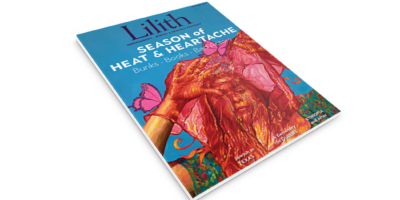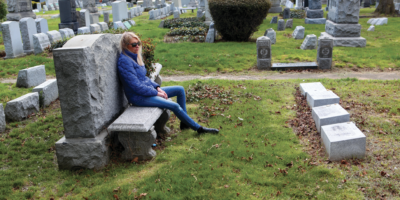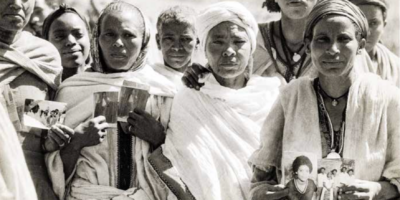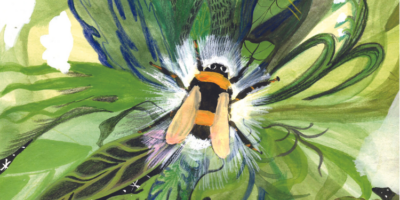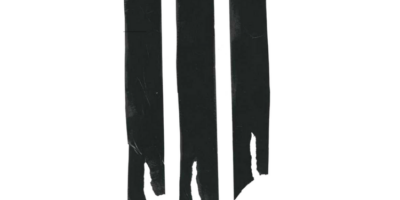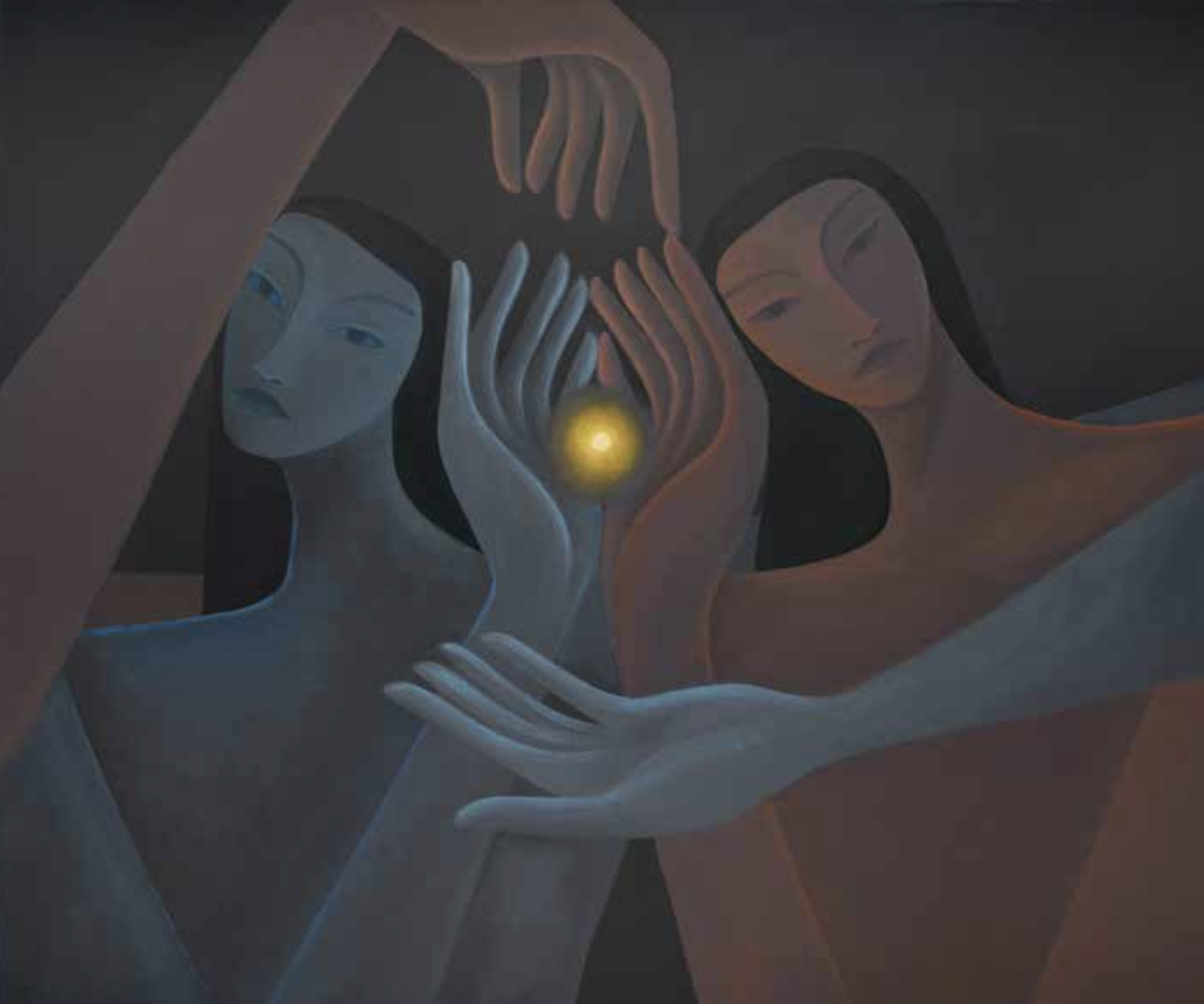
Art: Laura Berger
Fiction: Ours
Lumi is born on the full moon. The window in the hospital room has a clear view of the night sky diluted with milky light, and when you hear the sputtering cry of the newborn creature facing eviction from her den, you think of wolves.
After the cord has been snipped and the forms filled out, Phee and the baby nod off, exhausted from their harrowing journey. You roll the fish tank bassinet closer to the bed, then curl up at Phee’s feet. Their harrowing journey.
Just before dawn, Lumi wakes up and resumes her sputtering.
She settles as you wander up and down the hall with your pinky in her mouth. All is calm, but it feels like a million eyes are following you.
She’s probably hungry. You think of the weeks of pumping and the supplements to induce your own milk supply, and how excited you both were when it started to work. It was the first time since insemination that you found pride in Phee’s eyes—pride that included you. It was the first time you thought that maybe this could work.
All you have to do is stick your tit in Lumi’s mouth—she’s already gotten pretty good at the sucking part, judging by her latch on your finger. But you can’t do it. You are certain that the moment she is close enough to feel your skin, to smell the absence of birth hormones in your sweat, she’ll know—you’re an imposter.
You still haven’t nursed, but you keep pumping, just in case. And when she cries at night, you shuffle into her room and feed her a bottle while you point out the window and tell her about the moon and how her name means “bringer of light.” It all begins to feel normal.
Then, the damn donor dies.
Jake seemed like a total bonehead, to be honest—his Instagram profile boasted “shorties” and “gainz” and he would probably think it was hot that his jizz would be squirted into a lady by another lady while they touched each other’s boobs, or whatever lesbians did—but he had a perfect bill of health and no family history of mental illness, and you and Phee agreed—easier to teach a kid to read books and to not be a dick than to make insulin or serotonin.
Lumi was supposed to be able to meet him one day—if she got curious. Of course, you didn’t love the idea, but you also didn’t want your kid to have to wonder about her “father” like you did.
It was a hit and run, the email tells you. “He probably didn’t know you’re supposed to look both ways,” Phee mutters. You both laugh in spite of yourselves, then glance at each other sheepishly. The guy gave you his genetic material—he deserves some respect, or at the very least, a better joke.
The email is from Ruth, who says she is the donor’s mother. You scan the following paragraphs—details about the funeral, which you won’t be attending, and a few other pleas for connection, disguised as offers of toys and diapers. At the end there are several photos of Jake posing sweetly at various ages with an older woman who must be Ruth. It appears that he was a mama’s boy, which endears him to you and comforts Phee, as if attachment to one’s mother (mothers?) might be genetic. It also appears that Ruth knows about the open-contact agreement, and she wants in.
“How on earth did she find us?” You muse.
“She sounds lonely,” Phee says, moving Lumi to her other nipple.
“She does.”
“I want to reply,” Phee says. She gets that twinkly look in her eyes—the same look as when she first spotted Miss Grandpa at the animal shelter when you were there “just to look.”
“Can we sleep on it?”
Phee smiles, probably knowing she’s already won.
In the morning you and Phee reply to Ruth with condolences, gratitude for her offerings, and a photo of Lumi at three weeks old, flashing a gummy, flatulence-induced smile.
Ruth replies minutes later. Her words are moist with grief, and you feel yourself softening at her nervous delight over the photo. She marvels over Lumi’s shiny mop of black hair and her pointy little cupid’s bow and her sticky-outie ears. You can hear her tiptoeing.
Ruth is in your house. It has been one week since the first email and now she is sitting at your kitchen table. You listen to the polite small talk and bury your nose in Lumi’s hair, self-soothing with the tea-and-honey scent of her baby shampoo. When Phee sits next to you, she whispers, “unclench.” You try to breathe away the tension in your stomach and shoulders.
Ruth glances shyly at Lumi while she tells her story. Her husband left years ago but she didn’t like him much anyway, anymore, and by that time, half her kids were grown up. There are four—were four—Jake was the youngest. Although he was 26 when he died, he still lived at home—the only one of her children to stay in Cincinnati. Of course, some of the others offered to move her in with them—New York, San Francisco, Montreal, for god’s sake—but she hasn’t been on a plane in years, and the thought of leaving the place where Jake is buried doesn’t sit right. Her voice creaks.
“We sure are sorry for your loss,” Phee says, a hint of her long-denounced southern drawl creeping in. You watch her fidget with her cuticles. “If I may–do you know anything about Jake’s decision to be a donor?”
If the question surprises Ruth she doesn’t show it. “He was lost,” she says. “He was young when his father left and he never really had any sort of trajectory for his future. But he heard about the donor thing and he got stuck on the idea. I don’t know, I guess he felt like if he couldn’t figure out how to make good things happen for himself, maybe he could make them happen for someone else.”
So, maybe you were wrong about Jake.
“Maya,” Ruth turns to you. Re-clench.
“You’re Jewish, right? Maya Klein?”
“Yeah, but I didn’t have a bat mitzvah or anything.” You do not mention that foster care doesn’t care much about spiritual rites of passage.
Ruth nods cryptically, then asks, “Have you had a baby naming yet?”
“A what?” Phee asks.
“It’s a Jewish thing,” you offer, unhelpfully.
“Yes, and since the baby has a Jewish mother,” Ruth explains, “She’s Jewish too.” Despite yourself, you feel your shoulders suddenly loosen. You wonder if Ruth knows that you’re not the one who contributed 23 chromosomes and endured nine hours of labor. Then again, if she was able to track you and Phee down, she probably knows this too.
Lumi begins to fuss and Ruth takes it as her cue to leave. “Just think about it,” she says as she pulls on her coat.
In bed that night, Phee curls into you. “I wonder what it’s like to grow up with a mother like that—who cares enough to break the rules.”
You kiss her forehead. “Me too,” you sigh.
“Our baby will know,” Phee murmurs before she falls asleep.
Lumi has become nocturnal. She spends the darkest hours exercising her lungs, and now that Phee has started working again, nights are your job.
She has also decided that she will no longer be accepting a bottle—only a real, live nipple will do. Phee continues to nurse between video conferences and project deadlines, but nights are a shit show. “I don’t blame you, kid,” you sigh. “But you’re kind of a jerk when you’re hungry.”
One night, Lumi is howling at her special wake-up-the-whole-neighborhood volume and you decide to try a book. It’s the one about the big bad wolf and the three little pigs and you can’t help but wonder why the wolf is so bad—isn’t he just hungry?
Ruth is back with enough groceries for a family of six. “I went to Costco,” she explains, unloading a case of Pampers, the nice kind with the stripe that tells you when it’s full of piss.
“This is really too much,” Phee says, eyeing the organic strawberries and fair trade coffee beans you never buy for yourselves.
Ruth just smiles. Then she slips her jacket on and starts toward the door, giving Lumi a shy wave. You intercept her before she can make it out of the kitchen. “Wait,” you sigh. “Would you like to hold her?”
A light switches on in Ruth’s eyes.
She bounces Lumi gently, telling her how pretty she is, and when she hands Lumi back to you she thanks you with mist in her eyes.
At the door, Ruth pauses. “Being a new parent is hard,” she says. “If I were you, I would want all the help I could get. Like they say, it takes a village.”
“We don’t have one of those, do we?” you ponder that night, running your fingers through Phee’s curls.
“Huh?” she mumbles, already half asleep.
“A village.”
“We have our friends,” she offers, more awake now.
“Yeah, but they’re young and stupid and busy like us,” you say.
“Honey, we’re not that young anymore,” Phee teases.
“Seriously,” you press. “If something came up and we needed someone to babysit last-minute, or we ran out of diapers at six a.m., what would we do?”
The shared pain of having absent parents—either due to death by cancer or exile by homosexuality—brought you and Phee together in the first place. Your first date involved more trauma-bonding than flirting. But you have to admit—it would be helpful to have a seasoned grown-up around now.
“You want to keep her, don’t you?” Phee says.
“Who, Ruth?” you ask.
Phee nods. The sleep is creeping back into her eyes.
You picture the older woman in her empty house, once filled with kids. It twists your stomach in a way you know Phee would understand. “I think I might,” you say. But Phee is already asleep.
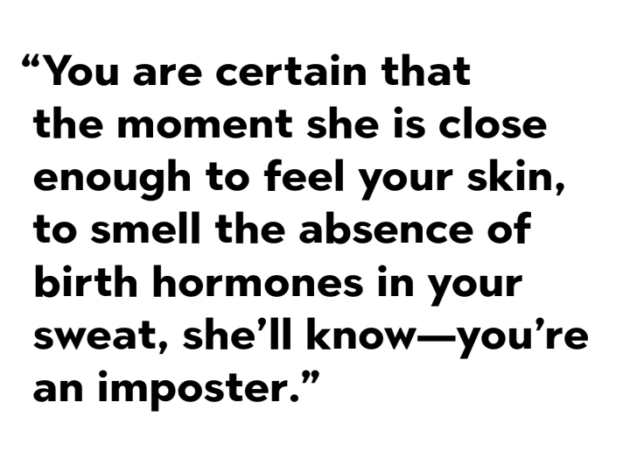
The next time Ruth shows up you are home alone with Lumi. Phee has gone into her office for a meeting and she’s promised to be home right away after. Your confidence has grown—you no longer hesitate before you pick Lumi up or feel eyes on you when you push her around in the carriage. But the one thing you cannot do is feed her. And so, naturally, you can’t stop imagining the infinite scenarios that might leave you helpless and Lumi starving—Phee being zipped into a body bag after a car accident or in a coma after an air conditioner falls on her head from the sixth story window of an apartment building or finally getting arrested for selling weed back in high school. You start to get more creative, picturing Phee breastfeeding in a hospital bed. Through bars. In the morgue, where you lower Lumi over her lifeless body to drain the last few drops of milk from her cold, stiff nipples. The doorbell rings.
“I talked to the rabbi,” Ruth says. She walks herself to the kitchen, where Lumi is blowing raspberries in her bouncer—it’s her latest trick and she squeals with delight when she spots her new audience member.
“Hello, darling,” Ruth says, leaning down to tickle her belly.
“We can do the baby naming the first week in May,” she says.
“You are certain that the moment she is close enough to feel your skin, to smell the absence of birth hormones in your sweat, she’ll know—you’re an imposter.”
You nod, trying to picture yourself standing with Phee and Lumi in front of a rabbi, but all you can see are the vague outlines of your mother’s funeral. You shake the image from your head.
“I know this isn’t up to me,” Ruth says. “I just think it would be nice for the baby to grow up knowing she’s part of the Jewish community, like her mom.”
To say that you are part of the Jewish community feels like a stretch, but it also feels warm. You look at Lumi to see if she has an opinion and her slobbery mouth spreads into a smile.
“I’ll talk to Phee tonight,” you say.
“Perfect,” Ruth says, clasping her hands together. It’s probably what she does when she knows she’s already won.
“I’m just not sure I’m comfortable with it,” Phee says. She’s made it home in one piece and is already unbuttoning her work blouse as she walks in the door.
“How come?” you ask, handing Lumi over.
Phee sighs, settling into the couch with the nursing pillow. “It’s this whole thing with Ruth. Plus, you’re not even religious. I don’t know, don’t you think it’s all kind of weird?”
Well, of course it’s weird. But so what? Ruth is helpful and lonely and the closest thing to a grandparent that you could ever give Lumi. “I like her,” you say. “I thought you liked her too. And I don’t know, this just feels important to me.”
“What if I wanted to have her baptized?” Phee says.
“Do you want to have her baptized?” You retort, eyebrow arched. You recall Phee telling you on your first date that she would never again set foot in a church, even if it was the “cool gay kind.”
“No,” she huffs. “I don’t want to impose any religion on our baby.”
You feel heat rising in your cheeks. “I’m not imposing religion on her! It’s not even about religion!” You stand and rush to the bedroom before Phee can see the tears fighting their way out of your face.
“What is it about, Maya?” Phee calls after you.
You shut the door.
Deep into the night Lumi starts screaming. You try all the tricks from the Youtube video about colic, to no avail.
You carry her out to the porch to get the noise out of the house. If there was ever a moment to try, it’s now, you think. And so you take a deep breath and unbutton your pajama top. You clumsily bring Lumi toward your chest. At the sight of her midnight snack, she begins to settle down. But still, you can’t. It’s as if your breast and her mouth are opposing ends of a magnet, and soon she starts up again, frustrated and taunted. Come on, Maya, you will yourself. You’re her mother, dammit.
“Maya?” You look up and Phee is in front of you, wrapped in a throw blanket. Her eyes are soft with sleep and concern and moonlight. “What are you doing out here?”
“I’m trying,” you say. A sob escapes your mouth when your eyes meet Phee’s.
“It’s okay,” she sighs, sitting beside you on the porch swing. “Maybe you’re still not ready.”
You shrug. “What if I never am?”
“That would be okay, too,” Phee says. Lumi is wailing again, but it’s your tears she wipes.
In the morning you sleep in. You find Phee at her desk with Lumi hanging from her in a sling. “Good morning, honey,” she says. She turns to face you. “I talked to Ruth. We’re doing the ceremony.”
“Really?” You blink, unsure if you heard her correctly.
Phee nods solemnly. “I want you to have this,” she says. “I want you and Lumi to have this.”
You nod with relief. “I love you,” Phee says, her eyes wide and serious.
“I love you too.”
Ruth arrives at eight A.M. the following Sunday. The backseat of her car is a mess of flower bouquets and at least a dozen balloons. It’s all pink and frilly and too much but there’s no time for protest.
The rabbi arrives promptly with a silver bob and a briefcase. She asks you and Phee a series of questions in rapid succession, eyes fixed to her clipboard. When she’s done, she asks to meet Lumi.
Soon, your friends begin to arrive with bottles of champagne and a rainbow of flowers. They tell you and Phee, “mazel tov,” and you picture them googling “Jewish baby naming greeting” as they buckled into their cars to drive to your house. Phee is pouring coffee, Ruth is introducing herself to your friends from work, Lumi is blowing raspberries in the rabbi’s arms and the rabbi is blowing them back. You feel buzzy and full.
Then it’s time to begin. The small crowd forms a semicircle around you and Phee, and the rabbi hands Lumi to you.
“Welcome, everybody,” the rabbi says in a measured public speaking voice. “I’m Rabbi Aviva Goldfarb. Today is a joyous day because today we will help Maya Klein and Phoebe Brenner welcome their child into the Jewish community and offer our blessings to them as they share the Hebrew name they have chosen.”
The rabbi winks at you, signaling your turn to speak.
“You all know I’m not a religious person,” you begin, “But for us, this isn’t about that. This is about connection.” Phee laces her fingers through yours, and with one hand holding your daughter and the other holding your wife’s hand you think, this is a family.
“It took us nine months to settle on the name Lumi. But it only took a couple of hours to agree on a Hebrew one.” You feel the tears beginning to rise in your eyes. “My mother, Zelda, was the strongest—and loudest—person I’ve ever known, but this kid is proving to be a close second.” A gentle laugh fills the room. “So, inspired by my mother’s strength and character, and by the self that Lumi has shown us, we’ve chosen the Hebrew name, Ze’ev. Our little wolf.” You hold her up to face her admirers—her village.
Your friends are smiling and oohing and aahing and the tears are slipping down your cheeks and Phee is squeezing your hand and everything blurs and softens around you as the rabbi sings words that ring with intangible familiarity.
After the ceremony, after you’ve thanked Ruth and packed her a box of bagels to take home and promised to call soon, after you’ve cleaned up and eaten dinner and given the balloons to the kid next door, you sit on the porch with your family. You watch the sun melt like a scoop of orange sherbert, with Lumi in your lap and Phee’s head on your shoulder. And when night swallows up the sky and sprouts a smooth, round moon, you all howl together.
Arielle Silver-Willner is Lilith’s Assistant Editor. Her work can be found in Lilith, Brooklyn Magazine, and The Jewish Women’s Archive. She’s currently working on a queer new adult novel.
Art by Laura Berger

